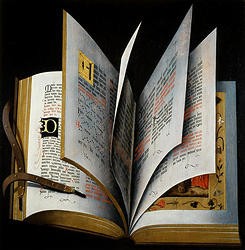Read by Alan Baragona
as edited by Larry Benson
The Canterbury Tales Complete
based on The Riverside Chaucer, Third Edition
Houghton Mifflin, 2000
(text reproduced below with permission)
Wife of Bath’s Tale, ll. 1073-1124 (The Wedding Night)
Now wolden some men seye, paraventure
That for my necligence I do no cure
To tellen yow the joye and al th’array
That at the feeste was that ilke day.
To which thyng shortly answeren I shal:
I seye ther nas no joye ne feeste at al;
Ther nas but hevynesse and muche sorwe.
For prively he wedded hire on morwe,
And al day after hidde hym as an owle,
So wo was hym, his wyf looked so foule.
Greet was the wo the knyght hadde in his thoght,
Whan he was with his wyf abedde ybroght;
He walweth and he turneth to and fro.
His olde wyf lay smylynge everemo,
And seyde, “O deere housbonde, benedicitee!
Fareth every knyght thus with his wyf as ye?
Is this the lawe of kyng Arthures hous?
Is every knyght of his so dangerous?
I am youre owene love and youre wyf;
I am she which that saved hath youre lyf,
And certes, yet ne dide I yow nevere unright;
Why fare ye thus with me this firste nyght?
Ye faren lyk a man had lost his wit.
What is my gilt? For Goddes love, tel it,
And it shal been amended, if I may.”
“Amended?” quod this knyght, “Allas, nay, nay!
It wol nat been amended nevere mo.
Thou art so loothly, and so oold also,
And therto comen of so lough a kynde,
That litel wonder is thogh I walwe and wynde.
So wolde God myn herte wolde breste!”
“Is this, ” quod she, “the cause of youre unreste?”
“Ye, certeinly,” quod he, “no wonder is.”
“Now, sire,” quod she, “I koude amende al this,
If that me liste, er it were dayes thre,
So wel ye myghte bere yow unto me.
“But, for ye speken of swich gentillesse
As is descended out of old richesse,
That therfore sholden ye be gentil men,
Swich arrogance is nat worth an hen.
Looke who that is moost vertuous alway,
Pryvee and apert, and moost entendeth ay
To do the gentil dedes that he kan;
Taak hym for the grettest gentil man.
Crist wole we clayme of hym oure gentillesse,
Nat of oure eldres for hire old richesse.
For thogh they yeve us al hir heritage,
For which we clayme to been of heigh parage,
Yet may they nat biquethe for no thyng
To noon of us hir vertuous lyvyng,
That made hem gentil men ycalled be,
And bad us folwen him in swich degree.”
